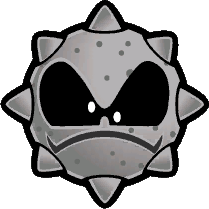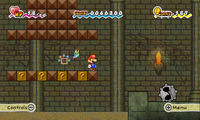Spiky Tromp
Template:Species-infobox Spiky Tromps are rocky enemies from Super Paper Mario. They are smaller versions of Spiny Tromps.
History
Super Paper Mario
In Super Paper Mario, Spiky Tromps are first seen in Yold Ruins. They slowly roll back and forth, changing directions when they hit a wall, and damage Mario, Luigi, Bowser, or Peach on contact. They are invincible and can only be defeated if Thoreau or Barry is used to make them fall into quicksand.
At one point in Yold Ruins, Mario must activate a blue switch that opens several trapdoors, from which a large amount of Spiky Tromps fall. Mario then must press a large red switch that causes the Spiky Tromps to fall into a pit, allowing him to safely walk on them and enter a door that was previously out of reach.
Spiky Tromps also appear in the minigame Tilt Island. They fall from the sky onto the island, and Mario loses a life if they hit him. If Mario collects a Flower, he is able to knock them away with a spinning attack, scoring 2000 points.
Profiles and statistics
| Super Paper Mario enemy | |||||||||
|---|---|---|---|---|---|---|---|---|---|
| Spiky Tromp | |||||||||

|
Max HP | N/A | Role | Common | Location(s) | Yold Ruins (1-4) | |||
| Attack | 1 | Card type | Uncommon | ||||||
| Defense | N/A | Items | Card location(s) | Card Shop; Flimm; Catch Card/SP | |||||
| Score | N/A | ||||||||
| Card description | This bowling boulder rolls around in search of prey. Don't get caught under the spikes, or you'll be tenderized. | ||||||||
| List of Catch Cards 113 114 115 |
Tattle | It's a Spiky Tromp. For some reason, it enjoys rolling left and right all day...You can't beat it... You can only avoid it... It will move until it hits a wall, then it will come right back at you... | |||||||
Names in other languages
| Language | Name | Meaning | Notes |
|---|---|---|---|
| Japanese | コロン[?] Koron |
Onomatopoeia for light rolling. | |
| German | Stachelblock[?] | Spike Block | |
| Italian | Tromp puntuto[?] | Pointed Tromp | |
| Korean | 대굴[?] Daegul |
Pun on '데굴(Degul)', onomotopoeia for rolling | |
| Spanish | Rocopunt[?] | Pun on "roca" (rock) and punta (pike) |
| Thwomps | ||
|---|---|---|
| Characters | Dossunmengyo • Gattai monster • Head Thwomp • Mr. Thwomp • Mrs. Thwomp • Sphinx Zō • Super Dossun • Thwomp Bros. • Thwomp Elevator • Waruiwa-gumi (leader) • Whomp King | |
| Species | Grindels | Grindel • Spindel |
| Pouncers | Omodon • Pouncer | |
| Whomps | Big Whomp • Whimp • Whomp | |
| Miscellaneous | Big Thwomp • Bone Thwomp • Karamenbo • Kongā • Mega Thwomp • Security Thwomp • Shoomp • Sniffle Thwomp • Spiked Thwomp • Star Thwomp • Stone Elevator • Tail Thwomp • Thwimp • Thwomp • Thwomp Platform | |
| Relatives | Grrrols | Grrrol • Mega Grrrol |
| Ka-thunks | Ka-thunk • King Ka-thunk | |
| Konks | Konk • Wonder Gottsun | |
| Spiny Tromps | Spiky Tromp • Spiny Tromp | |
| Thwacks | Thwack • Thwack Totem • Wonder Thwack | |
| Wallops | Wallop • Walleye | |
| Other | Bomp • Flomp • Grumblump • Rhomp • Stairface Ogre • Stone-Eye • Tox Box • Tsubushi • Walking Block | |
